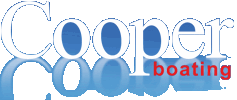
COOPER BOATING news ~ latest information about boating in BC
Following up on the meaning behind the bareboat concept of our earlier post, it seems appropriate to look at how we at Cooper work as agents to take care of our bareboat guests.
The legal side does create certain obligations and a competent charter agent can help with all of those. Cooper's two guiding principles surround COMFORT and INSURABILITY.
Comfort aboard comes not only from the boat itself and its fit, finish and equipment, but the comfort of the skipper and crew operating the boat their experience and familiarity with the vessel type. Perhaps it has been several years since you last skippered a vessel. In this case, the prudent skipper often reaches out for some assistance to refresh their skills - either via a formal lesson before hand or by taking someone at the beginning of a bareboat charter holiday to help break free of the boating cobwebs and ensure that the skipper is comfortable handling the vessel and the navigator is up to back up to speed on coastal pilotage.
Familiarity with a vessel type leading to comfort aboard does depend on whether or not this is a boat you've operated before (or a near sistership). Changing vessel types - especially large changes like different prop configurations or North American vs. European manufacturers - can lead to an increased challenge for a skipper. We've seen the greatest frequency of changes when people make large changes to the type or size of vessel they are using.
Some of the same factors that drive comfort also affect insurability of a skipper. As mentioned in the post about the word 'bareboat', the insurance on the vessel is transferring to the charter client for the duration of the trip as if they were an owner. Insurance depends on the risk factor and that includes experience, most specifically recent experience on the size and vessel type. A long track record of boating experience without an accident is a great step to being insurable, as is formal training - especially hands-on training to a national or international standard.
Ironically, when renting a vessel, it is not essential to have a Pleasure Craft Operator Card (PCOC) - providing one walks through a rental boat checklist and signs this off as the charter commences. The fact is, the PCOC seems to be addressing specific accident situations and is especially focused on vessels smaller than those in our charter fleet - the standard of training and competence required to be insured on a charter vessel is far greater than the level offered by a PCOC alone.
If there is an accident in one's past, it does not preclude insurability - one accident can be a vital learning experience - but it should be fully disclosed so that future risks are properly covered. Indeed, we use past experience from debriefing accident situations to alert future people to the inherent risks of operating a boat on our coast. Come to think of it, everything provided to back up one's experience as provided on a boating resume should be completely factual as it becomes an integral part of the charter arrangements. The insurance company isn't out there checking everything up front necessarily, but if the boating resume is found to contain fictional content when following up a claim, it would certainly jeopardize the insurance coverage in place.
While some of this sounds heavy and does carry with it real obligations, we have been working with folks wanting to have fun on the water for over a quarter of a century now and can make most of this fall to the routine. So, if we're suggesting something to help you bolster your resume it merely stems from our guiding concept that we want to you be properly insured and comfortable on the boat of your choice. Let's get going with your spectacular experience!
TAGS
TWITTER POSTS
CALENDAR
2009
about us | news | our fleet | charters | courses | club | gallery | events | brochure | contact us | privacy policy
1832 mast tower road, granville Island, vancouver, british columbia, CANADA V6H 4B6 | reservations phone 604.687.4110 or toll-free 888.999.6419
administration phone 604.683.6837 fax 604.687.3267
administration phone 604.683.6837 fax 604.687.3267
this site is registered with yachts.com and yacht charters.com










